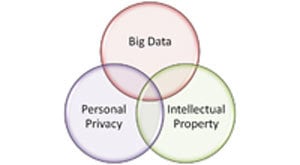
Although a lot has been written about big data and the challenge / opportunity it presents to enterprises and individuals, the sparks really start to fly whenever commercial exploitation of digital information and content (incl. big data), enters the realms of personal privacy and IP rights (IPR).
Big data
According to a recent Forrester report, your typical firm has on average 125TB of data but only actually utilise 12 per cent of it. This shocking statistic brings home a key attribute and challenge of big data, namely the sheer volume, velocity and variety of data that resides and travels across multiple channels / platforms within and between organisations. As a result, many organisations have turned to ever more advanced analytics and business intelligence solution (including big data and social media) to extract value from the sea of information.
Personal privacy
Given such powerful tools, and the vast amount of replicated information across various sources, it is relatively easy to get a picture of any individual’s situation, strengths and limitations. For many organisations, such data could become ‘toxic’ if and when they suffer any loss of control. However, personal privacy is subjective at best, and there are differing world views on whether it should be considered a constitutional or fundamental human right.
Furthermore, the explosion in speed / type / channel of interaction may have brought about a certain degree, (perhaps even an expectation or acceptance), of reduced privacy. However, although some users may be happy to share personal data in exchange for financial gain, according to a recent SSRN paper, data protection and privacy entrepreneurship may have their place, but ‘people should not have to pay to protect their privacy or receive coupons as compensation’, especially as this might further disadvantage the poor.
Intellectual property
In addition to the above issues, organisations also have to deal with the drama of IP rights and how they apply to the masses of unstructured data and content. In other words, every last piece of the aforementioned 125TB of big data held within your average organisation will have some associated IPR which must be taken into consideration when collecting, storing, processing or sharing that information. According to some legal experts, companies need to think through certain fundamental legal aspects of IPR, e.g. ‘who owns the input data companies are using in their analysis, and who owns the output?’
If you consider all the information / content, (including employee 'personal' content), sloshing around in every organisation, then you might begin to perceive the scale of the problem. There may be a lucrative opportunity for information mining and analysis algorithms aimed at the computer audit and forensic investigations market.
The way forward
Below are three things that organisations should bear in mind when dealing with the issues and problems posed by big data, privacy and IP:
- Information is the lifeblood of business - implement the right policies for big data governance. The right information, at the right time, for the right user, is the holy grail for business, and it demands capabilities in data science and increasingly Data Art
- Soon it may not really matter who owns your data - Personal information is becoming another currency with which the customer can obtain value. There is a growing push to focus big data governance / controls on data usage rather than data collection.
- It’s not the tool, but how you use it - technology is not really that much a differentiator, rather it is the architecture and infrastructure approach that make all the difference - e.g. Forrester’s report recommended the ‘hub and spoke’ model for decentralised big data capability3
In conclusion, although it may appear that the heady combination of big data, privacy and IP could be lethal for any organisation, we mustn’t ignore real opportunities to reap the benefits of big data insight, but first the organisation must put its house in order by adopting the right policies and principles for big data governance.
Note: The above post is adapted from my article of the same title, which was published in the September edition of ITNOW magazine, by BCS, The Chartered Institute for IT.
- Gartner - Information and the Nexus of Forces: Delivering and Analyzing Data (26, June 2012) - Analyst: Yvonne Genovese
- BCS TWENTY:13 ENHANCE YOUR IT STRATEGY - Intellectual property in the era of big and open data (01-03-2013) - Jude Umeh FBCS CITP
- Forrester - Deliver On Big Data Potential With A Hub-And-Spoke Architecture (12, June 2013) - Analyst: Brian Hopkins
- SSRN - Buying and Selling Privacy: Big Data's Different Burdens and Benefits (30-June-2013) - by Joseph Jerome (Future of Privacy Forum)
- Out-law.com - Big data: privacy concerns stealing the headlines but IP issues of equal importance to businesses
- BCS Edspace Blog - Big data: manage the chaos, reap the benefits - (17-May-2013) Marc Vael (International VP of ISACA)
- Capping IT Off - Forget Data Science, Data Art is Next! - Simon Gratton

















